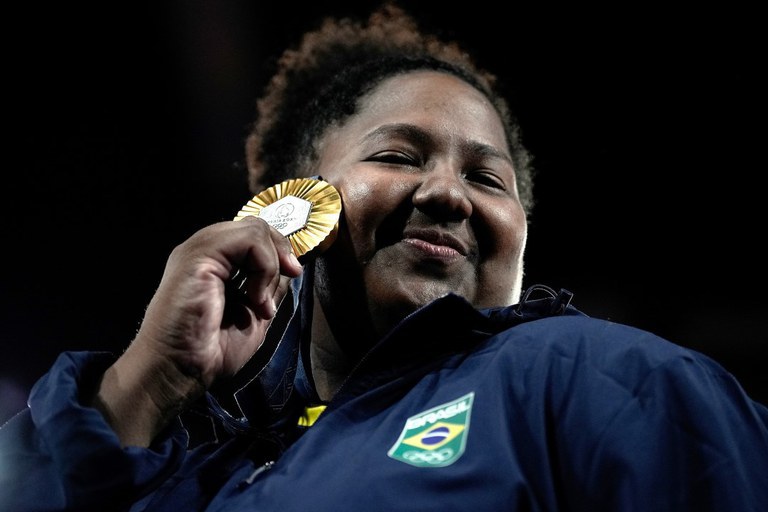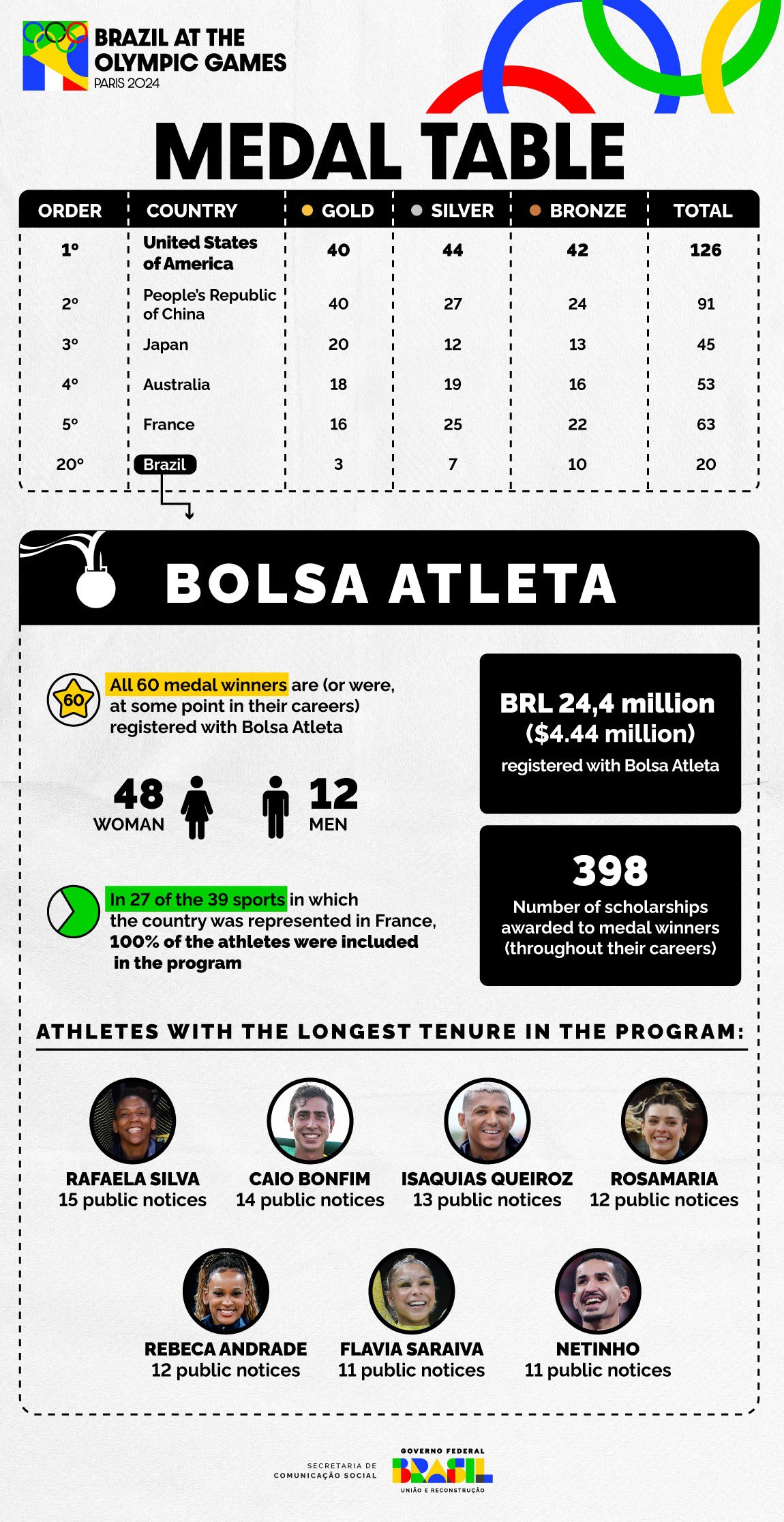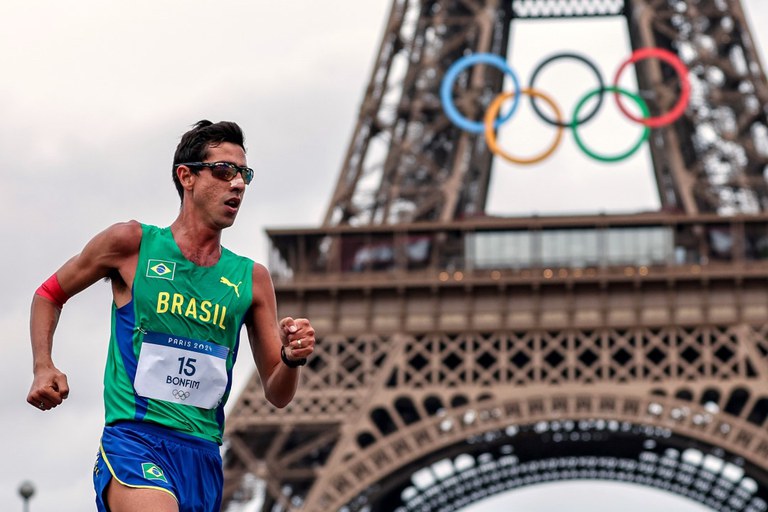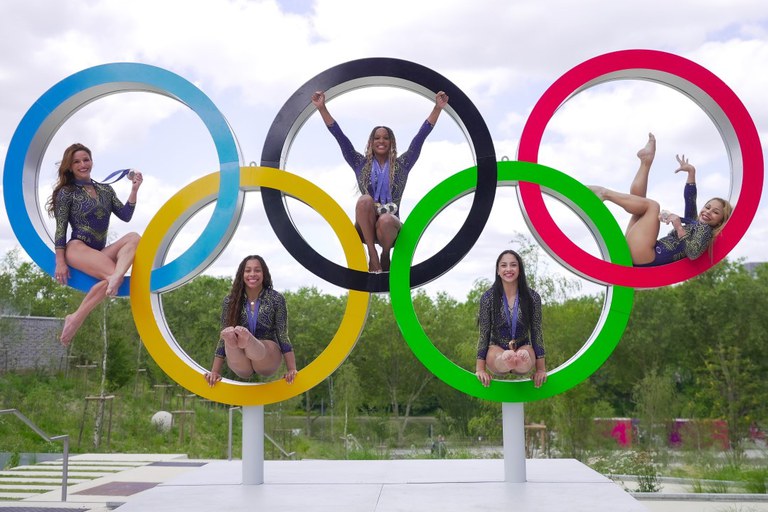Notícias
OLYMPICS
In Paris, Bolsa Atleta nears goal of supporting 100% of Brazilian medalists

Beatriz Souza secured Brazil’s first gold medal in the women’s +78kg judo category - Credit: Alexandre Loureiro / COB
Brazil concluded the Paris 2024 Olympic Games with 20 medals, representing its second-best performance in the country's history. The Brazilian delegation secured three gold medals, seven silver medals, and ten bronze medals, placing the country 20th in the medal count and 12th in total podium finishes.
In France, women athletes from Brazil made history by breaking long-standing records and achieving unprecedented success. For the first time, women outperformed men, securing more medals in a single Olympic Games. Of the 20 medals, 12 were won by women in events designated for female competitors, including one in a mixed judo team competition, while the men claimed seven.
The Bolsa Atleta program (Athlete Scholarship Program) has been instrumental in driving these achievements. This federal sponsorship initiative has been pivotal in enabling the success of every Brazilian medalist at the event. Among the 60 medalists in Paris—48 women and 12 men—100% are current or former participants in the Bolsa Atleta program.
Gabriel Medina, a professional surfing icon and medalist, is no longer in the program but previously received funding during two rounds. Similarly, Larissa Pimenta (judo) benefited from federal support for ten years, while Isaquias Queiroz (canoe sprint) was funded for 13 years.
“Two Olympic cycles ago, after identifying an opportunity for growth in women’s sports, the Brazilian Olympic Committee (Comitê Olímpico do Brasil/COB) began targeted investments in women athletes. This effort also included increasing the number of female coaches and managers. What we witnessed in Paris reflects societal changes: women are increasingly empowered,” said Mariana Mello, deputy head of the Paris 2024 mission and COB’s Sports Planning and Performance manager.
The numbers underscore the critical role of the Bolsa Atleta program for Brazilian athletes. We performed admirably in Paris, and I want to congratulate everyone who represented our country with determination and passion. We will continue to support Brazilian sports to drive even greater progress.”
ANDRÉ FUFUCA,
Minister of Sports
Brazilian women's performance was noteworthy, as they secured gold medals. Beatriz Souza won the first in the +78kg judo category. Rebeca Andrade became Brazil’s most decorated Olympian, earning gold in the artistic gymnastics floor exercise. Finally, Duda and Ana Patrícia ended a 28-year women’s beach volleyball drought, bringing Brazil back to the podium.
Eight of the 22 women's soccer team players who won silver in Paris are not currently in the program, but all have received Bolsa Atleta support at some point in their careers. Similarly, two of the 12 players on the women’s volleyball team, which won bronze in France, are not part of the program in 2024, but all have benefited from the Bolsa Atleta during their careers.
DETERMINATION AND PASSION — The total investment by the federal government through the Bolsa Atleta program in the careers of medalists is BRL 24.4 million ($4.44 million), with 398 scholarships awarded. The program has a number of athletes who have been awarded the most scholarships over the course of their careers. These include Rafaela Silva (judo), who has received 15 scholarships; Caio Bonfim (race walking), who has received 14 scholarships; Isaquias Queiroz (canoe sprint), who has received 13 scholarships; Rosamaria (volleyball), who has received 12 scholarships; and Rebeca Andrade, who has also received 12 scholarships.

“The numbers underscore the significance of the Bolsa Atleta program for Brazilian athletes. We performed admirably in Paris, and I want to congratulate everyone who represented our country with determination and passion. We will continue to support Brazilian sports to drive even greater progress,” stated Minister of Sports André Fufuca.
According to Iziane Marques, national secretary of High-Performance Sports, the program’s success “demonstrates its effectiveness and our commitment to consistently supporting Brazilian sports talents, providing the conditions for them to reach their full potential. The Bolsa Atleta is more than just financial support; it ensures our athletes are not alone in their journeys and underscores that Brazil values and invests in sports as a tool for development and achievement.”
Beyond its impact on medalists, the Bolsa Atleta program also supported most of the Brazilian delegation in Paris. In the most recent round, 241 of the 276 athletes representing Brazil in the French capital were part of the program, accounting for 87.3%. Considering athletes' career histories, 271 of the 276 have been involved in the Federal Government's program at some point (98%). In 27 of the 39 disciplines in which Brazil was represented in France, 100% of the athletes are currently part of the Ministry of Sports' direct sponsorship program.

- In addition to winning an unprecedented silver medal, Caio Bonfim placed seventh in the mixed team racewalking event alongside Viviane Lyra. Photo: Miriam Jeske / COB
DIRECT INVESTMENT — The athletes highlight the program’s significance to Brazilian sports. “The Bolsa Atleta is crucial because it helps us purchase training equipment and provides financial security for our families, which is often most needed. It allows us to concentrate on our performance without external worries. This comfort and confidence enable athletes to excel, make their country proud, and achieve personal growth. It encourages us to keep pushing forward,” said Rebeca Andrade, who won four medals in Paris (1 gold, 2 silvers, and 1 bronze) and became Brazil’s most decorated Olympian (2 golds, 3 silvers, and 1 bronze).
Tied for second place with Robert Scheidt and Torben Grael, Isaquias Queiroz secured a silver medal in Paris, bringing his total to five Olympic medals (1 gold, 3 silvers, and 1 bronze). “My first paycheck came from the Ministry of Sports [Ministério do Esporte] through the Bolsa Atleta program. Without it, I wouldn't have continued to stay in sports. I’m very grateful for the support I have received over the years,” said Isaquias.
For Caio Bonfim, who earned a historic silver medal for Brazil in racewalking at the Paris Games, the Bolsa Atleta has been integral to his journey. “We all like to complain, but not about this. I started racewalking in 2007, and I’ve been a recipient of the Bolsa Atleta ever since. It provided the security and peace of mind I needed to keep progressing,” said Bonfim.
Gymnast Lorrane Oliveira, who won an unprecedented bronze in the team event alongside Rebeca Andrade, Flávia Saraiva, Jade Barbosa, and Júlia Soares, highlighted the Bolsa Atleta’s critical role in her career. “Without the Bolsa Atleta, my career would have been completely different. I started with nothing, and my family faced financial difficulties. This program supported me throughout my journey, and I wouldn’t be here without it,” emphasized Oliveira.

HISTORIC RESULTS — The COB also highlighted the country’s progress across many disciplines at the Paris Games. In athletics, the mixed team racewalking event — featuring Caio Bonfim and Viviane Lyra — placed 7th in its debut. Luiz Maurício set a South American record in the javelin throw, reaching an Olympic final for Brazil for the first time in 92 years. In the high jump, Valdileia Martins broke a 35-year-old Brazilian record with a personal best of 1.92m. Almir Junior became the first Brazilian triple jump finalist since the 2008 Summer Olympics in Beijing.
In badminton, Juliana Viana secured Brazil’s first Olympic victory. Gustavo “Bala Loka” placed 7th in BMX Freestyle, finishing in the top 10. Mafê Costa became the first 400m finalist in 76 years and broke the 200m record in the 4x200m relay with a time of 1:56.06. Miguel Hidalgo finished 10th in the individual triathlon, marking the best-ever placement for a Brazilian at the Olympics.
In another milestone, Bárbara Domingos reached the individual final in rhythmic gymnastics, and the women’s rugby sevens team secured a victory over Fiji, the bronze medalists from the Tokyo 2020 Olympics.